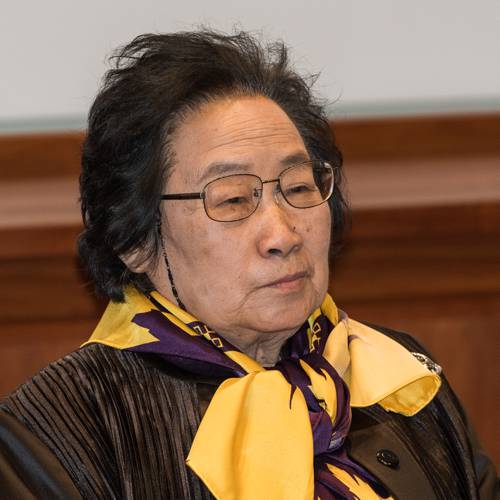
FAQ About Tu Youyou

Who is Tu Youyou?
Tu Youyou is a renowned Chinese scientist known for discovering artemisinin, an antimalarial drug that has saved millions of lives worldwide. Born on December 30, 1930, in Ningbo, China, she was a key figure in what was known as "Project 523," a government initiative aimed at developing new antimalarial therapies during the Vietnam War.

What is artemisinin?
Artemisinin is an antimalarial compound extracted from the sweet wormwood plant (Artemisia annua). It is highly effective against Plasmodium falciparum, the parasite responsible for the most severe form of malaria. The discovery of artemisinin marked a significant breakthrough in malaria treatment, leading to artemisinin-based combination therapies (ACTs) that are now standard treatment for malaria in many parts of the world.

How did Tu Youyou discover artemisinin?
Tu Youyou discovered artemisinin through a methodical screening process of traditional Chinese herbal remedies. After researching ancient texts and experimenting with various extraction techniques, she found that a low-temperature extraction process of the sweet wormwood plant preserved the antimalarial properties. This led to the isolation of artemisinin in 1972, which proved to be remarkably effective in treating malaria.

What was Project 523?
Project 523 was a secret military project initiated by the Chinese government in May 1967 to find new antimalarial drugs in response to increasing cases of drug-resistant malaria during the Vietnam War. Tu Youyou was appointed as the head of the project and her team's efforts eventually led to the discovery of artemisinin.

What awards has Tu Youyou received for her work?
Tu Youyou has received numerous awards for her groundbreaking discovery, including the 2011 Lasker DeBakey Clinical Medical Research Award and the 2015 Nobel Prize in Physiology or Medicine, which she shared with William C. Campbell and Satoshi Ōmura for their discoveries concerning novel therapies against infections caused by roundworm parasites.

Why is the discovery of artemisinin significant?
The discovery of artemisinin is considered one of the most significant advances in malaria treatment. It has drastically reduced malaria mortality rates and remains a cornerstone in the global fight against malaria, especially in regions where drug-resistant malaria strains have emerged. Artemisinin and its derivatives are key components in artemisinin-based combination therapies (ACTs), which are recommended by the World Health Organization (WHO) for treating malaria.

How has artemisinin impacted malaria treatment worldwide?
Artemisinin has revolutionized malaria treatment worldwide due to its rapid action and high efficacy. It has significantly lowered the mortality and morbidity rates related to malaria, particularly in sub-Saharan Africa and Southeast Asia, where the disease is most prevalent. Its integration into ACTs has been crucial in combating drug-resistant strains of malaria, providing a more effective treatment option than previous drugs.

What challenges did Tu Youyou face in her research?
Tu Youyou faced several challenges during her research, including a lack of modern equipment and resources, political obstacles during the Cultural Revolution in China, and the challenge of convincing others of the efficacy of her findings. Despite these difficulties, her perseverance and use of traditional Chinese medical texts led to the successful isolation of artemisinin.

What is the sweet wormwood plant?
The sweet wormwood plant, also known as Artemisia annua, is an herb native to China. It has been used in traditional Chinese medicine for centuries to treat various illnesses. The plant is particularly significant because it contains artemisinin, the active ingredient discovered by Tu Youyou, which is used in treating malaria.

Why did Tu Youyou use traditional Chinese medicine in her research?
Tu Youyou utilized traditional Chinese medicine (TCM) as it offered a vast reservoir of knowledge about herbal treatments used over centuries. She believed that ancient texts could provide potential clues to effective treatments for modern diseases like malaria. Her strategy involved reviewing these texts to identify plants used historically for fever and disease, which ultimately led to the discovery of artemisinin.

What is artemisinin-based combination therapy (ACT)?
Artemisinin-based combination therapy (ACT) is a modern malaria treatment approach that combines artemisinin derivatives with other antimalarial drugs. This combination helps enhance treatment efficacy and reduce the risk of drug resistance. ACTs are recommended by the World Health Organization (WHO) as the first-line treatment for uncomplicated Plasmodium falciparum malaria.

How did Tu Youyou's discovery influence future research?
Tu Youyou's discovery of artemisinin not only provided an effective treatment for malaria but also spurred further research into traditional medicines as potential sources for new drug development. Her work has inspired scientists to explore and validate traditional remedies using modern scientific methods, bridging the gap between ancient knowledge and contemporary scientific approaches.

What role did traditional Chinese texts play in Tu Youyou's research?
Traditional Chinese texts played a crucial role in Tu Youyou's research as they served as a foundational source of knowledge regarding herbal treatments. She meticulously studied ancient medical texts to identify potential leads for antimalarial compounds, eventually finding references to the sweet wormwood plant's use in treating malaria-like symptoms, which led to her breakthrough discovery of artemisinin.

How has Tu Youyou's work contributed to public health?
Tu Youyou's work has contributed enormously to public health by providing an effective treatment for malaria, which is one of the world's most deadly parasitic diseases. The introduction and widespread use of artemisinin and ACTs have led to a substantial reduction in malaria-related deaths and illnesses, particularly in developing countries where malaria is endemic.

What impact did Tu Youyou's Nobel Prize win have on scientific research?
Tu Youyou's Nobel Prize win highlighted the importance of integrating traditional knowledge with modern scientific research. It has encouraged a broader recognition and exploration of traditional medicines across the scientific community, promoting interdisciplinary approaches to drug discovery and validating the potential of traditional remedies in combating modern diseases.

What is Tu Youyou's educational background?
Tu Youyou studied at the Beijing Medical College, now known as Peking University Health Science Center, where she graduated in 1955. She furthered her studies in the traditional Chinese medicine research division at the Academy of Traditional Chinese Medicine, where she later made her groundbreaking discovery of artemisinin.

How has artemisinin-based combination therapy (ACT) helped fight drug resistance in malaria treatment?
ACTs have significantly helped fight drug resistance in malaria treatment by combining artemisinin with other antimalarial drugs, thereby enhancing the efficacy and minimizing the chance of the malaria parasite developing resistance. The combination therapies work synergistically; while artemisinin rapidly reduces the number of parasites in the bloodstream, the partner drug clears the remaining parasites, thereby delaying resistance development.

What is the significance of the year 1972 in relation to Tu Youyou's research?
The year 1972 is significant because it marks the year when Tu Youyou successfully isolated artemisinin from the sweet wormwood plant. This breakthrough discovery was the culmination of rigorous research and experimentation and has since become one of the most effective treatments for malaria.

What is the global significance of Tu Youyou's discovery today?
Today, Tu Youyou's discovery of artemisinin holds global significance as it remains a key component in tackling malaria, a major public health challenge. It continues to save millions of lives annually, particularly in malaria-endemic regions, and represents one of the most important developments in tropical medicine in the 20th and 21st centuries.

How did Tu Youyou's educational background contribute to her research approach?
Tu Youyou's educational background in both modern pharmacology and traditional Chinese medicine greatly contributed to her research approach. Her ability to blend these disciplines enabled her to explore and identify effective components in traditional remedies through a rigorous, scientific framework. This innovative approach led to the successful discovery and validation of artemisinin as a potent antimalarial drug.
